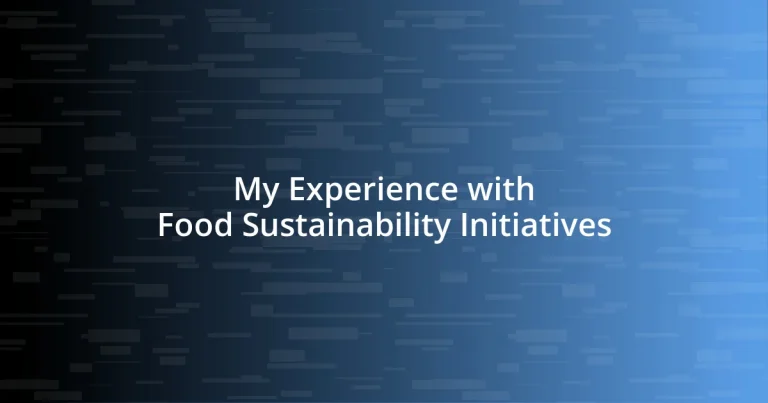Key takeaways:
- Engaging with local food systems and sustainable practices fosters community connection, supports local farmers, and reduces environmental impact.
- Personal actions, such as choosing seasonal ingredients and minimizing packaging waste, significantly contribute to a sustainable lifestyle.
- Challenges in food sustainability initiatives include resistance to change, financial barriers for small farmers, and consumer behavior that prioritizes convenience over sustainability.
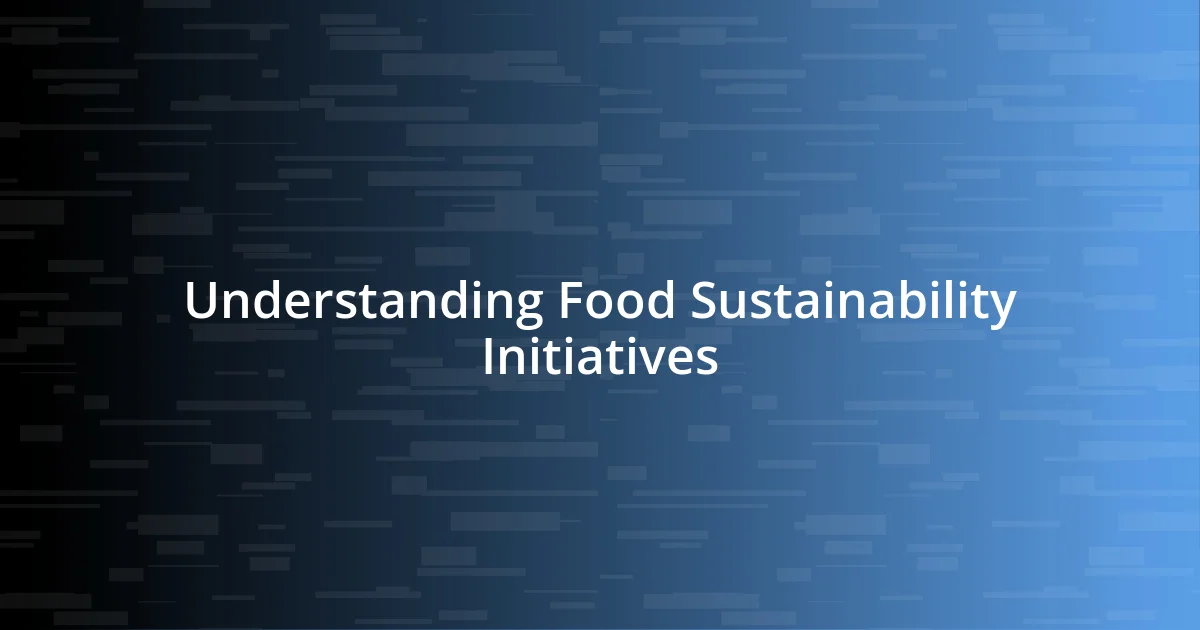
Understanding Food Sustainability Initiatives
Food sustainability initiatives represent a lifeline for our planet, aiming to make our food systems more equitable and environmentally friendly. I remember attending a local farmer’s market where I saw firsthand the vibrant colors of organic produce and spoke with farmers who were deeply invested in sustainable practices. It made me realize how every choice we make at the grocery store can impact not just our health, but also the wellbeing of our communities and ecosystems.
Have you ever thought about where your food comes from? It’s striking how many miles food travels before it reaches our plates. This concept of food miles made me reassess my own eating habits. I vividly recall a moment when I chose locally sourced ingredients for a dinner party, and not only did the food taste fresher, but the conversations around the table stirred a deeper appreciation for our local farmers and their hard work.
Many of these sustainability initiatives include reducing waste, improving soil health, and providing fair wages for workers. Participating in community gardens has been a game-changer for me. I’ve dug my hands into the soil, feeling the earth beneath me, and as I nurtured those plants, I felt a profound connection to the food I consume. It’s a reminder that sustainability isn’t just a trend; it’s a movement that reflects our shared responsibility towards a healthier planet.
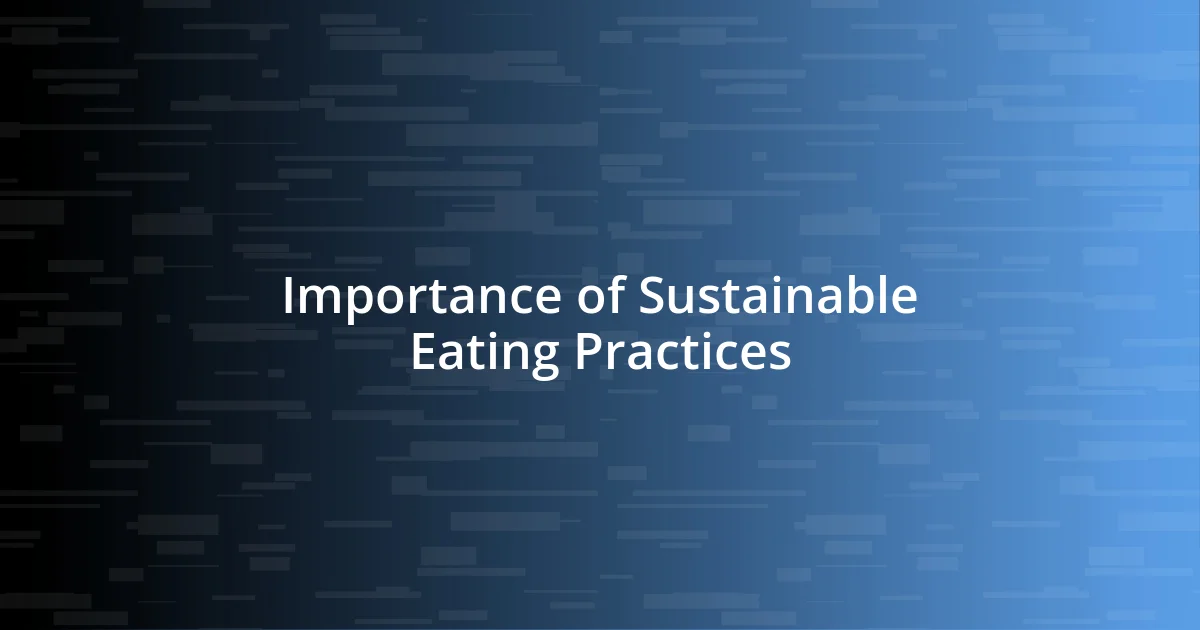
Importance of Sustainable Eating Practices
Sustainable eating practices are fundamental to addressing the urgent environmental crises we face. They encourage us to be mindful of our consumption habits and the broader impacts of our lifestyle choices. I remember during a potluck with friends where we all committed to bringing dishes made from seasonal and local ingredients. Not only did it lead to a mouthwatering spread, but it sparked conversations about how our choices contribute to a healthier planet. It’s in these moments that the power of sustainable eating truly shines.
Here are a few reasons why embracing sustainable eating practices is crucial:
- Reduced Carbon Footprint: By choosing local foods, we cut down on transportation emissions.
- Support for Local Farmers: Buying from local sources fosters community resilience and helps keep farms viable.
- Biodiversity Conservation: Sustainable practices often promote a variety of species, enhancing ecosystem health.
- Healthier Diet: Seasonal produce is often fresher and packed with more nutrients.
- Waste Reduction: Mindful eating encourages us to utilize food scraps and reduce overall waste.
In my experience, these practices give us a tangible way to care for our environment while nourishing our bodies. As I adopt these habits, I feel a compelling connection not just to the food I eat, but to the planet we all share.
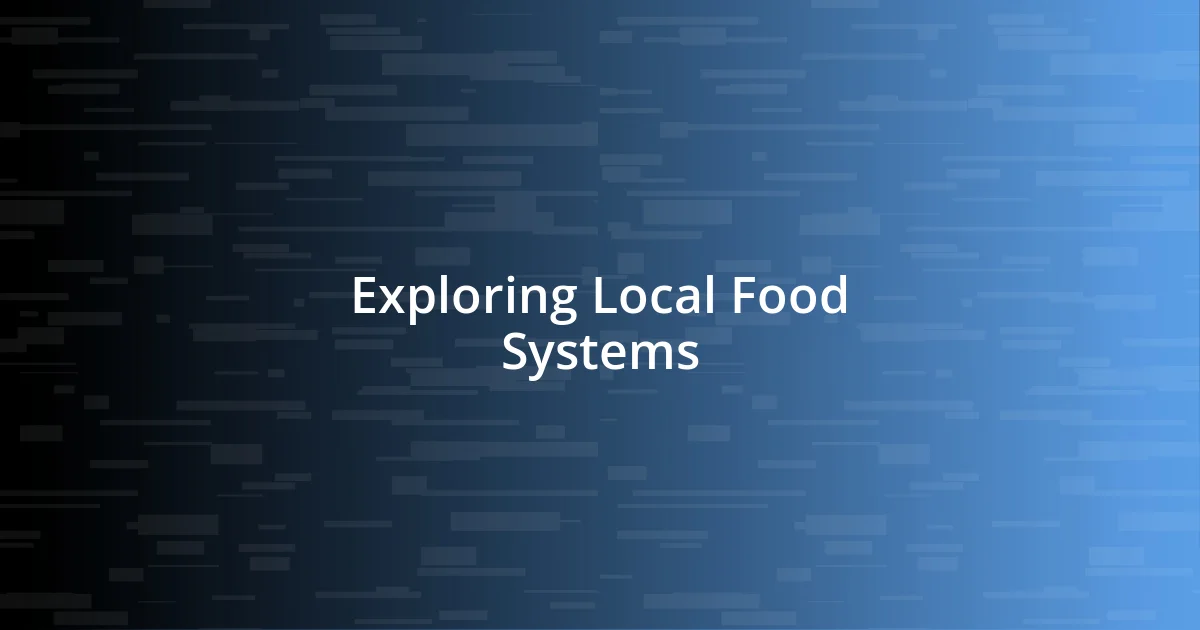
Exploring Local Food Systems
Exploring local food systems has been a transformative journey for me. I recall visiting a community farm that utilized permaculture principles, focusing on sustainable practices to maintain the land and produce food. The farmer was so passionate, explaining how crop rotation and companion planting not only enrich the soil but also create diverse ecosystems. It opened my eyes to the intricacies of local food systems and reinforced how crucial they are in promoting biodiversity in our diets.
During another visit to a farm-to-table restaurant, I chatted with the chef who sourced every ingredient from just a few miles away. He shared stories about the local farmers he worked with, highlighting their commitment to organic practices. The meal I enjoyed was more than just food; it was a reflection of the season and the care taken to nurture each ingredient. This personal connection between the chef, the farm, and the consumer made the dining experience incredibly special and meaningful.
I often think about how supporting local food systems can strengthen community ties. At a recent food festival, I met families who relied on local produce and were actively involved in supporting their neighbors’ farms. The sense of community spirit was palpable. It’s these interactions that remind me of the importance of transparency in our food systems, as they foster trust and solidarity within our local economy.
| Local Food Systems | Conventional Food Systems |
|---|---|
| Emphasizes seasonal, sustainable practices | Often relies on monoculture and long supply chains |
| Supports local economies and farmers | Benefits large agribusiness and corporations |
| Encourages community engagement | Tends to be isolated from consumer interaction |
| Prioritizes biodiversity and ecosystem health | May lead to reduced biodiversity |
| Fosters a sense of trust and connection | Less relationship between producers and consumers |
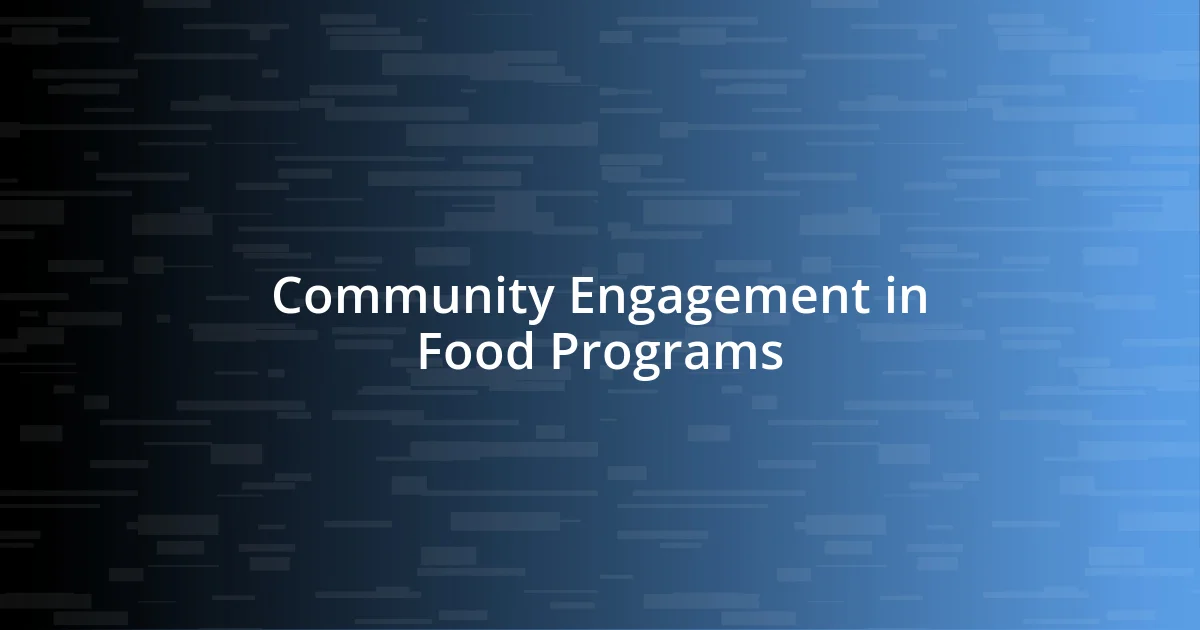
Community Engagement in Food Programs
Engaging the community in food programs goes beyond just sharing meals; it fosters a sense of belonging and collaboration. I remember when my local urban garden organized a monthly volunteer day. It was incredible to see people from different backgrounds come together, getting their hands dirty while exchanging stories and laughing. Wasn’t it inspiring to witness how a simple act of planting could weave such strong connections among neighbors?
What I find truly moving is how these food programs often highlight the unique stories within a community. A few months ago, I attended a community potluck where everyone brought a dish that represented their heritage. The table overflowed with flavors, from spicy curries to savory pies, and each participant shared the tale behind their dish. Can you imagine how much perspective and appreciation for diversity was cultivated in that moment?
Through these experiences, I’ve come to realize that communication is as vital as the food itself. During a local farmers’ market meeting, someone suggested we create a newsletter to keep everyone informed about seasonal produce and sustainability events. It struck me how a shared platform not only educates but also empowers community members to take an active role in food sustainability. How can we encourage more voices to join this conversation and shape our food landscape? It’s definitely something worth pursuing.

Personal Actions for Sustainable Choices
Taking personal action towards sustainable food choices has transformed how I approach meals daily. I’ve made it a habit to visit local farmers’ markets each weekend. The fresh produce isn’t just vibrant and flavorful; it also connects me directly to the farmers who grow my food. Have you ever thought about how much more rewarding it is to know the story behind your tomatoes or how they were farmed? I appreciate reading the labels and chatting with the growers, gaining insight into their sustainable practices, which makes each purchase feel like a conscious choice.
Additionally, I’ve started keeping a well-rounded pantry filled with seasonal ingredients. I love experimenting with what’s available. For instance, when zucchini is at its peak, I dive into creating stuffed zucchini boats or zoodles to enjoy a healthy twist on pasta. It’s amazing how planning meals around what’s harvested encourages creativity in the kitchen while promoting sustainability. Isn’t it fulfilling to know you’re supporting local agriculture while reducing food waste?
Moreover, I’ve taken a step back to reduce my reliance on pre-packaged items. By embracing bulk buying and meal prepping, I’ve seen a drop in my kitchen waste. Once, after transitioning to glass containers, I felt a weight lift off my shoulders, knowing I was cutting down on single-use plastics. Have you ever felt that sense of accomplishment when making small changes that lead to better environmental choices? It’s these little actions that build up over time, and they truly reflect our commitment to a sustainable lifestyle.
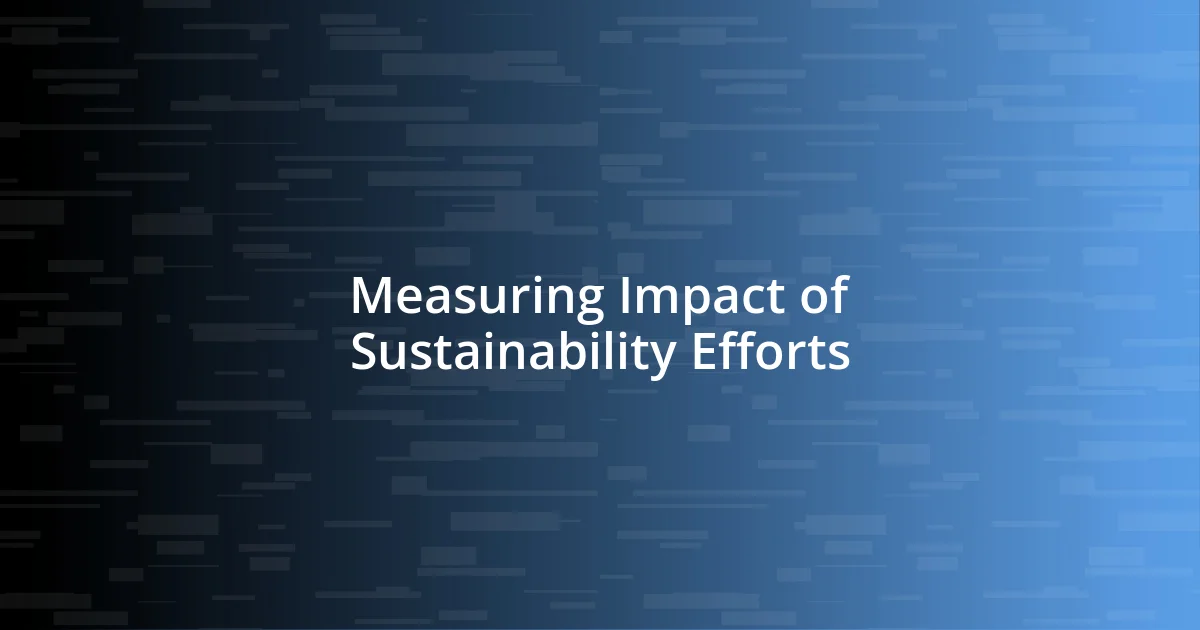
Measuring Impact of Sustainability Efforts
Measuring the impact of sustainability efforts can sometimes feel like navigating a complex maze. In my experience, one effective way is through tracking changes in community engagement and awareness. I recall participating in a survey at a local sustainability fair where attendees shared their newfound knowledge about composting. The excited conversations buzzing around me made it clear: that event actually shifted mindsets. Isn’t it amazing how a single gathering can catalyze such enthusiasm for eco-friendly practices?
Another method I’ve found invaluable is evaluating the quantitative data related to food waste reduction. For instance, during a community initiative to encourage composting, we monitored the amount of organic waste collected over several months. It was heartening to see a consistent decrease in landfill waste; it really showcased our collective effort. Have you ever wondered how powerful numbers can be in transforming community behaviors?
Lastly, qualitative feedback offers a deeper understanding of impact. After a cooking workshop teaching participants how to make the most of leftovers, I received heartfelt messages from attendees about how they’ve changed their cooking habits. One individual detailed how they revamped their family’s meal planning, significantly cutting down on food waste. These personal stories resonate, revealing that success isn’t just in numbers but in the emotional connection people have with sustainable practices. It’s through this blend of metrics and narratives that we truly grasp the impact of our sustainability efforts.
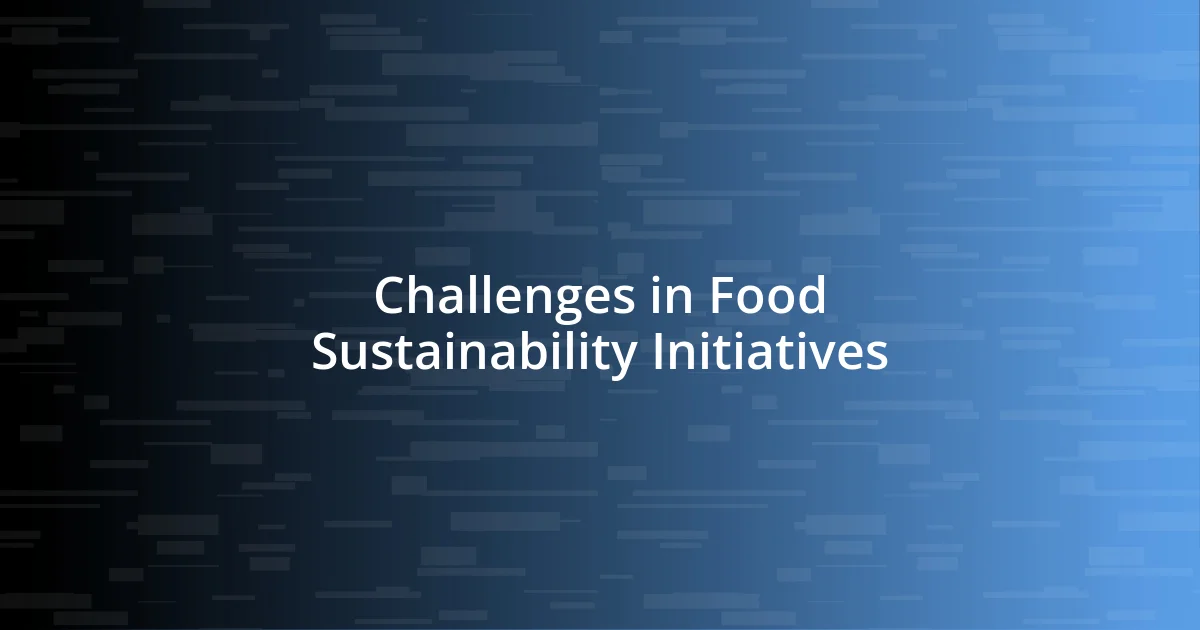
Challenges in Food Sustainability Initiatives
Initiating food sustainability initiatives comes with its share of challenges, and one major hurdle I’ve encountered is resistance from established food systems. In my own journey, I volunteered at a community garden where the goal was to introduce more organic practices. However, some longtime gardeners were skeptical about the shifts. Have you ever experienced pushback when trying to implement change? It’s tough to convince someone, who has been set in their ways for years, to embrace new methods, even when those methods promise greater benefits.
Another hurdle I’ve faced is the financial barrier associated with sustainable practices. I once attempted to organize a local event to promote organic farming, but many small farmers struggled to afford the associated costs. It made me realize: how can we expect transformation when economic viability is a significant roadblock? I often find myself asking how we can bridge this gap between idealism and practicality. Sustainable options should be accessible, yet the reality frequently contradicts this ideal.
Moreover, navigating the complexities of consumer behavior is no easy feat. The last time I tried to educate friends about the merits of eating locally and seasonally, I was met with the convenience of fast food as a counterargument. Isn’t it frustrating when the lure of convenience overshadows sustainability? This experience taught me that simply advocating for change is not enough; we must also find ways to make greener choices more appealing and convenient for everyone, fostering a truly sustainable mindset within our communities.












